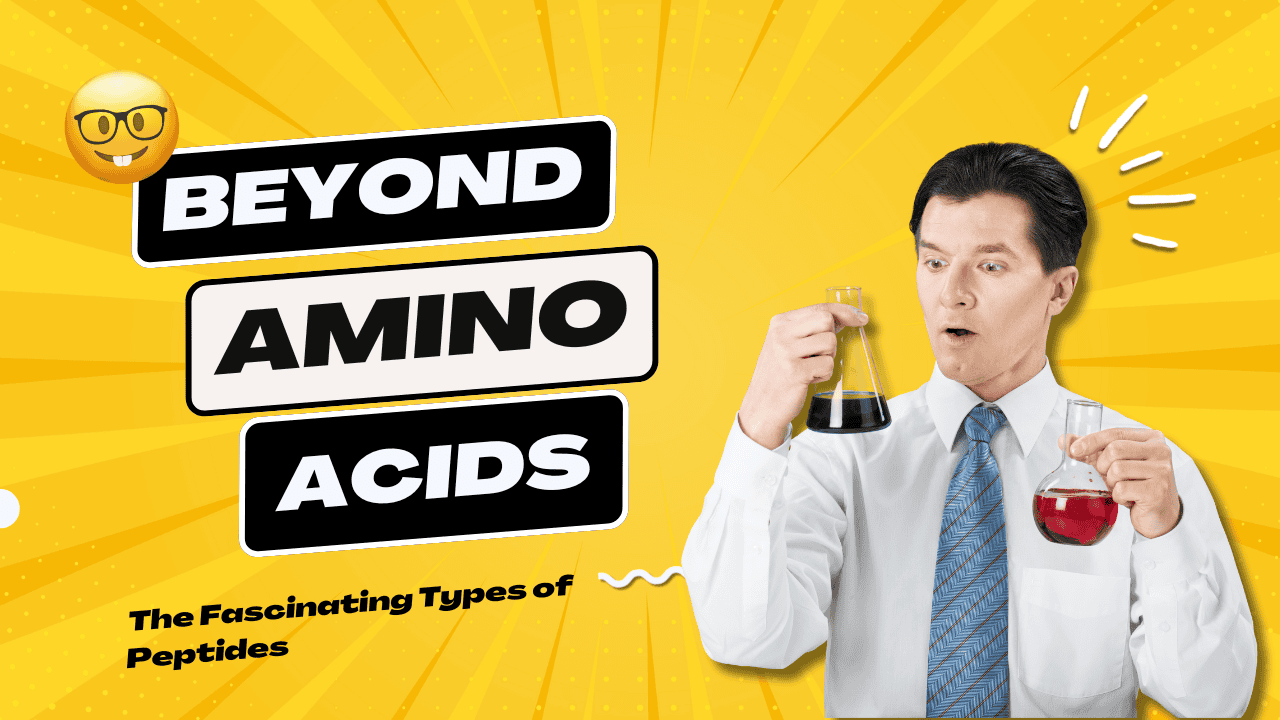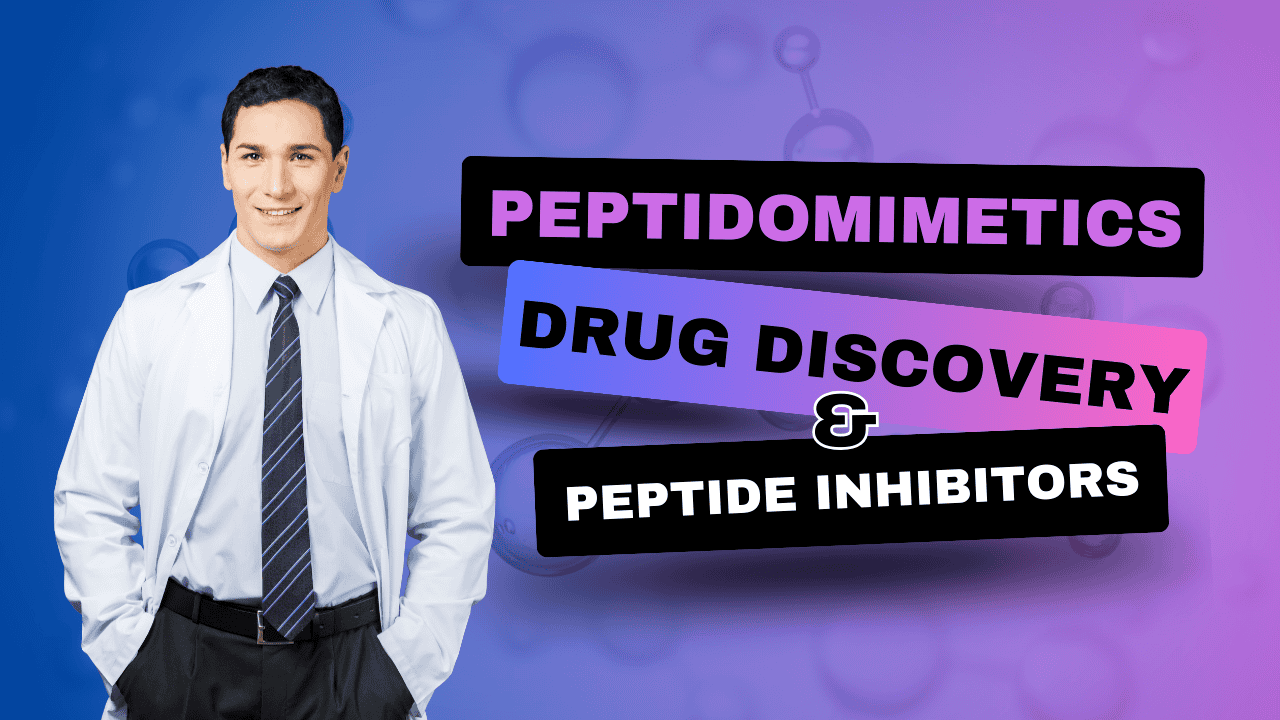

Peptides are gaining momentum in the science and health community, piquing interest beyond the basics of amino acids and proteins.
But what makes them so special?
Worth the read for anyone eager to venture beyond the molecular basics, this deep dive will illuminate the myriad forms and functions of peptides.
Peptides are short chains of amino acids, typically containing fewer than 50 amino acids. The peptide bonds link these amino acids together, creating a sequence that can serve various physiological functions.
While proteins are composed of long chains of amino acids, often folding into complex three-dimensional structures, peptides are short chains of amino acids. This difference in length and complexity imparts unique properties to peptides, making them more versatile in some contexts.
Peptides are crucial because they participate in an array of biological processes. From being hormones and signaling molecules to having antimicrobial properties, peptides may interact with cells and tissues in myriad ways.
Amino acids are the building blocks of both peptides and proteins. The fascinating world of peptides begins with these simple molecules.
Peptides are made up of amino acids. Each peptide bond forms between the carboxyl group of one amino acid and the amine group of another, resulting in the loss of water.
A peptide bond is a covalent bond that forms between two amino acids. This bond is strong, but hydrolysis can break it down, releasing individual amino acids.
Peptides are formed through processes that link amino acids together via peptide bonds. This can occur naturally in the body or be engineered in the lab as synthetic peptides.
Different types of peptides exist, each with unique properties and functions.
Peptides are classified according to their sources and functions, from ribosomal peptides to antimicrobial peptides. The different types of peptides each play specialized roles in biological systems.
The types of peptides differ by their amino acid sequences and the way they’re formed. Some are cyclic peptides, forming rings, while others are linear. Oligopeptides consist of fewer amino acids, while polypeptides contain more.
Functional peptides like bioactive peptides, play specific roles in cell signaling, immunity, and even as antioxidants. They are small but mighty in their biological impact.
Understanding the science of peptide bonds is crucial to grasping how peptides work.
A peptide bond forms through a dehydration synthesis reaction, where a water molecule is released as two amino acids link together.
Different types of peptide bonds include those in linear chains and more complex structures involving covalent bonds and hydrogen interactions.
While peptide bonds are robust, they can be broken by hydrolysis. Factors like pH and temperature can influence their stability.
Are peptides just mini-proteins, or do they hold distinct roles?
The main difference lies in size and complexity. Proteins are more extensive and complex, often taking intricate shapes, whereas peptides are short but versatile.
In some cases, yes! Shorter chains or polypeptides may fold and combine to form functional proteins.
Both are composed of amino acids linked by peptide bonds. However, their functions and complexity can vary significantly.
Peptide therapy is making waves in modern medicine.
Peptide therapy involves using synthesized or natural peptides to target specific health conditions. By mimicking naturally occurring peptides, they can interact with cells and systems in precise ways.
Peptide therapy can offer benefits in areas like muscle growth, skin health, and even cognitive function. Certain peptides are known for treating diseases, improving metabolic rate, and aiding in recovery.
While peptide therapy has potential, it carries risks like any medical treatment. Side effects can occur, and the long-term implications are still being studied.
Peptides are not just for health; they play a significant role in beauty too.
Peptides are often used in skincare products due to their ability to penetrate the skin barrier and stimulate collagen production, reducing lines and wrinkles.
Using peptide products can improve skin elasticity, firmness, and hydration. Collagen peptides are particularly known for their anti-aging benefits.
Absolutely! Peptides may stimulate collagen production, increase hydration, and promote skin elasticity, making them a potent anti-aging ingredient.
The practical use of peptides extends beyond healthcare and skincare.
Using peptides in medication allows for targeted therapies with fewer side effects. Their ability to mimic natural peptides can lead to treatments for a variety of conditions.
Peptides in dietary supplements can support muscle growth, fat loss, and overall health. They can also act as antioxidants and support cognitive function.
Given their versatility and biocompatibility, peptide-based therapies may represent the future of personalized medicine.
Navigating the world of peptide products can be tricky.
Look for reputable brands, check ingredient lists, and ensure the product targets your specific needs. Consulting with a healthcare provider can also be beneficial.
Popular products include skincare serums, collagen supplements, and fitness aids. Adding peptides to your routine can be game-changing.
If they meet your specific needs and come from reputable sources, peptide products can be a valuable addition to your health or beauty regimen.
Understanding the natural formation of peptides can enhance our appreciation of their roles.
Peptides are formed during protein synthesis through the ribosome, which links amino acids via peptide bonds.
Enzyme action can either facilitate the synthesis of peptides or break them down through hydrolysis, ensuring a balance of peptide levels in the body.
Diet can impact the availability of amino acids necessary for peptide formation. Consuming a protein-rich diet can support natural peptide synthesis.
Deepen your understanding of the bonds that make peptides.
The standard peptide bond between the carboxyl and amine groups is most common, but other bonds like disulfide bridges also play a role.
Hydrogen bonds can stabilize peptide structures, particularly in more complex polypeptides and proteins.
Disulfide bonds introduce extra stability, often found in peptides with structural roles or those requiring a specific conformation to function.
Peptides are naturally versatile, impacting various bodily functions.
Peptides can influence metabolic pathways, playing roles in nutrient absorption, hormone secretion, and enzymatic functions.
Peptide hormone molecules act as signaling agents in the body, orchestrating processes like growth, metabolism, and reproduction.
Absolutely. Neuropeptides are involved in transmitting signals in the brain, affecting mood, cognition, and overall brain function.
Modern medicine is leveraging peptides for therapeutic purposes.
Peptide-based therapeutics have shown effectiveness in treating various conditions, from metabolic disorders to cancer.
Yes, peptide-based drugs are being developed to treat chronic diseases like diabetes, cardiovascular diseases, and even neurodegenerative conditions.
Innovations include targeted delivery systems and synthetic peptides designed to mimic natural ones more closely, improving efficacy and safety.
Peptides are a cornerstone of modern biological research.
Peptides’ ability to mimic natural processes makes them invaluable for research in areas like drug development, molecular biology, and genetics.
Scientists use solid-phase peptide synthesis and recombinant DNA technology to create peptides for research purposes.
Challenges include peptide stability, synthesis complexity, and ensuring specificity of peptide functions in experimental settings.
Peptides’ versatility extends across numerous fields.
Athletes may use peptides to enhance performance, improve recovery times, and support muscle growth. Some peptides are even regulated by the world anti-doping agency.
Certain peptides can signal muscle growth factors, aiding in increased muscle mass and recovery.
Peptides can influence fat metabolism, promote fat loss, and regulate appetite, making them beneficial in weight management.
What’s next for this fascinating field?
Trends include developing multi-functional peptides, integrating artificial intelligence in peptide design, and personalized peptide therapy.
Peptide research is likely to expand into more personalized medicine, with treatments tailored to individual genetic profiles and specific conditions.
Expect breakthroughs in disease-targeting peptides, biodegradable peptides for drug delivery, and even more sophisticated skincare products.
Exploring the chemistry of peptides reveals even more about their significance.
Peptide chains can fold into various secondary structures like alpha-helices and beta-sheets, influenced by hydrogen bonds and disulfide bridges.
Peptides partake in numerous reactions, including hydrolysis, phosphorylation, and glycosylation, impacting their function and stability.
Peptides link together to form polypeptide chains, which then fold and interact to create functional proteins.
Nature provides a rich trove of peptides beneficial for health.
Foods like meat, fish, dairy, and certain plants are rich in peptides. Consuming these can support the body’s peptide levels naturally.
Plant peptides are effective and can offer similar benefits, supporting health and wellness through various biochemical pathways.
Animal-derived peptides might be more readily absorbed, but plant peptides often offer antioxidant benefits and are easier on the digestive system.
Peptides perform specialized activities essential for life.
Peptides participate in cell signaling, immune responses, and as neurotransmitters. Their versatile nature makes them central to many biological processes.
Antimicrobial peptides disrupt bacterial cell membranes, providing a defense mechanism against infections.
Peptides can modulate the immune response, either enhancing it to fight pathogens or suppressing it in conditions like autoimmune diseases.
The lab brings peptides to life, offering numerous applications.
Synthetic peptides are produced using solid-phase synthesis, where amino acids are added sequentially to form the desired peptide chain.
Often, yes. Synthetic peptides can mimic natural functions and sometimes offer greater stability and purity.
Uses include drug development, vaccines, and as research tools to study protein-peptide interactions.
Skincare science is embracing peptides with open arms.
Peptide creams penetrate the skin to stimulate collagen synthesis, hydrate, and repair damaged skin.
Yes, these serums promote even skin texture, elasticity, and can reduce visible signs of aging.
Read labels for specific peptides, follow instructions, and be patient, as the results can take time.
Peptides have a foot in both academic and commercial worlds.
Academic experts are exploring peptides in drug delivery, cancer treatment, and understanding disease mechanisms at the molecular level.
Companies are developing peptide-based drugs, skincare products, and even dietary supplements, translating research into real-world applications.
Patents can drive innovation by securing intellectual property, though they can also limit the accessibility of new peptide discoveries.
Biotech and peptides are a match made in heaven.
Peptides serve as vectors to deliver genes into cells, playing a crucial role in gene therapy and genetic modification.
Peptides can target drugs to specific cells or tissues, improving the efficacy and safety of treatments.
Peptide-based vaccines use specific sequences to elicit immune responses, providing targeted and safer vaccination options.
Peptides offer a world of possibilities, embodying a blend of simplicity and complexity that continues to drive scientific curiosity and innovation.
Tetrapeptides are four amino acids linked together by peptide bonds. These short sequences can exhibit various important functions, such as signaling or interacting with connective tissues.
There are several types of peptides, each classified based on their structure and function:
Common peptides include collagen peptides, glutathione, tripeptides, dipeptides, and growth hormone peptides. These peptides perform various important functions, such as supporting skin health, detoxification, and muscle growth.
An example of a peptide is glutathione. It consists of three amino acids: glutamine, cysteine, and glycine. Glutathione is an antioxidant that helps protect cells from oxidative damage.
Four types of peptides include:
A chain of peptides is known as a polypeptide chain. These chains are composed of many amino acids linked together by peptide bonds.
A tetrapeptide contains four amino acids connected by three peptide bonds. These bonds link the amino acids into a short chain.
Peptides are short chains of amino acids connected by peptide bonds. They vary in length and complexity, from dipeptides to tetrapeptides and beyond.
One of the most commonly used peptides is collagen peptides. These peptides help in skin health, joint function, and overall connective tissue support.
The top 5 peptides for health are:
Dr. Sidney W. Fox was a pioneering biochemist noted for his groundbreaking work in the field of peptides, particularly in peptide bond formation and the study of prebiotic chemistry. Dr. Fox’s research significantly contributed to our understanding of how peptides may offer insights into the origins of life and essential biological processes.
Dr. Fox’s notable publications include:
The Proteinoid Theory: Perchance to Protolife – Dr. Fox explores the synthesis of proteinoids and their role in the early stages of life. This seminal paper has been cited numerous times and remains a cornerstone in the study of life’s origins.
Thermal Copolymerization and the Origin of Life – This study delves into the thermal copolymerization of amino acids and the implications for the origin of biological macromolecules, a theme central to Dr. Fox’s work.
His research has earned him accolades and recognition in the scientific community, including the Oparin Medal from the International Society for the Study of the Origin of Life. Dr. Fox’s innovative approaches and impact underscore his authority and trustworthiness in peptide research, making significant contributions to molecular biology and nucleic acids studies.
Dr. Miklos Bodanszky was an esteemed chemist renowned for his expertise in peptide synthesis. His contributions vastly advanced the methods by which synthetic peptides are produced, providing critical tools and methodologies that are still in use today.
Notable publications by Dr. Bodanszky include:
Principles of Peptide Synthesis – This authoritative book is a comprehensive resource on peptide synthesis, detailing the chemical principles and techniques crucial to the field. It has become a fundamental text for researchers and students alike.
Peptide Synthesis; A Practical Approach – This practical guide offers a detailed account of various synthetic procedures and experimental techniques, cementing Dr. Bodanszky’s reputation as a leading expert in peptide chemistry.
Dr. Bodanszky’s contributions are characterized by meticulous attention to detail and a commitment to advancing scientific knowledge. His work provided invaluable insights into peptide and protein interactions, laying the groundwork for modern therapeutic approaches. Dr. Bodanszky’s esteemed career includes numerous awards and citations, reflecting his substantial impact on peptide science and his role as a trusted authority in the discipline.
Hong, F., Ming, L., Yi, S., Zhanxia, L., Yongquan, W., & Chi, L. (2008). The antihypertensive effect of peptides: A novel alternative to drugs? Peptides, 29(6), 1062–1071. https://doi.org/10.1016/j.peptides.2008.02.005
Kang, L., Han, T., Cong, H., Yu, B., & Shen, Y. (2022). Recent research progress of biologically active peptides. BioFactors, 48(3), 575–596. https://doi.org/10.1002/biof.1822
Kašička, V. (2013). Recent developments in capillary and microchip electroseparations of peptides (2011–2013). Electrophoresis, 35(1), 69–95. https://doi.org/10.1002/elps.201300331
Kašička, V. (2017). Recent developments in capillary and microchip electroseparations of peptides (2015–mid 2017). Electrophoresis, 39(1), 209–234. https://doi.org/10.1002/elps.201700295
Myšková, A., Sýkora, D., Kuneš, J., & Maletínská, L. (2023). Lipidization as a tool toward peptide therapeutics. Drug Delivery, 30(1). https://doi.org/10.1080/10717544.2023.2284685
Qiu, R., Sasselli, I. R., Álvarez, Z., Sai, H., Ji, W., Palmer, L. C., & Stupp, S. I. (2022). Supramolecular copolymers of peptides and lipidated peptides and their therapeutic potential. Journal of the American Chemical Society, 144(12), 5562–5574. https://doi.org/10.1021/jacs.2c00433
Tyagi, A., Tuknait, A., Anand, P., Gupta, S., Sharma, M., Mathur, D., Joshi, A., Singh, S., Gautam, A., & Raghava, G. P. (2014). CancerPPD: a database of anticancer peptides and proteins. Nucleic Acids Research, 43(D1), D837–D843. https://doi.org/10.1093/nar/gku892
Xiao, X., Zhou, M., Cong, Z., Zou, J., & Liu, R. (2022). Advance in the polymerization strategy for the synthesis of Β‐Peptides and Β‐Peptoids. ChemBioChem, 24(3). https://doi.org/10.1002/cbic.202200368
Zakharova, N., Shornikova, A., Bugrova, A., Baybakova, V., Indeykina, M., Kononikhin, A., Popov, I., Kechko, O., Makarov, A., & Nikolaev, E. (2017). Evaluation of plasma peptides extraction methods by high-resolution mass spectrometry. European Journal of Mass Spectrometry, 23(4), 209–212. https://doi.org/10.1177/1469066717720907
Zou, J., Zhou, M., Xiao, X., & Liu, R. (2022). Advance in hybrid peptides synthesis. Macromolecular Rapid Communications, 43(23). https://doi.org/10.1002/marc.202200575
ALL ARTICLES AND PRODUCT INFORMATION PROVIDED ON THIS WEBSITE ARE FOR INFORMATIONAL AND EDUCATIONAL PURPOSES ONLY. The products offered on this website are intended solely for research and laboratory use. These products are not intended for human or animal consumption. They are not medicines or drugs and have not been evaluated or approved by the FDA to diagnose, treat, cure, or prevent any disease or medical condition. Any form of bodily introduction is strictly prohibited by law.








Discount Applied Successfully!
Your savings have been added to the cart.